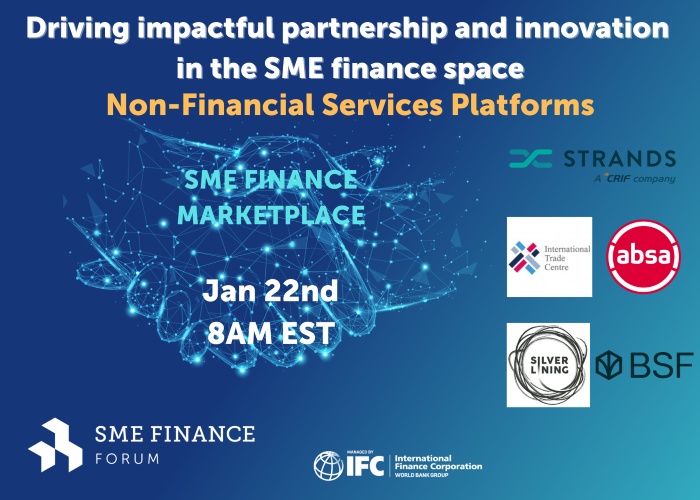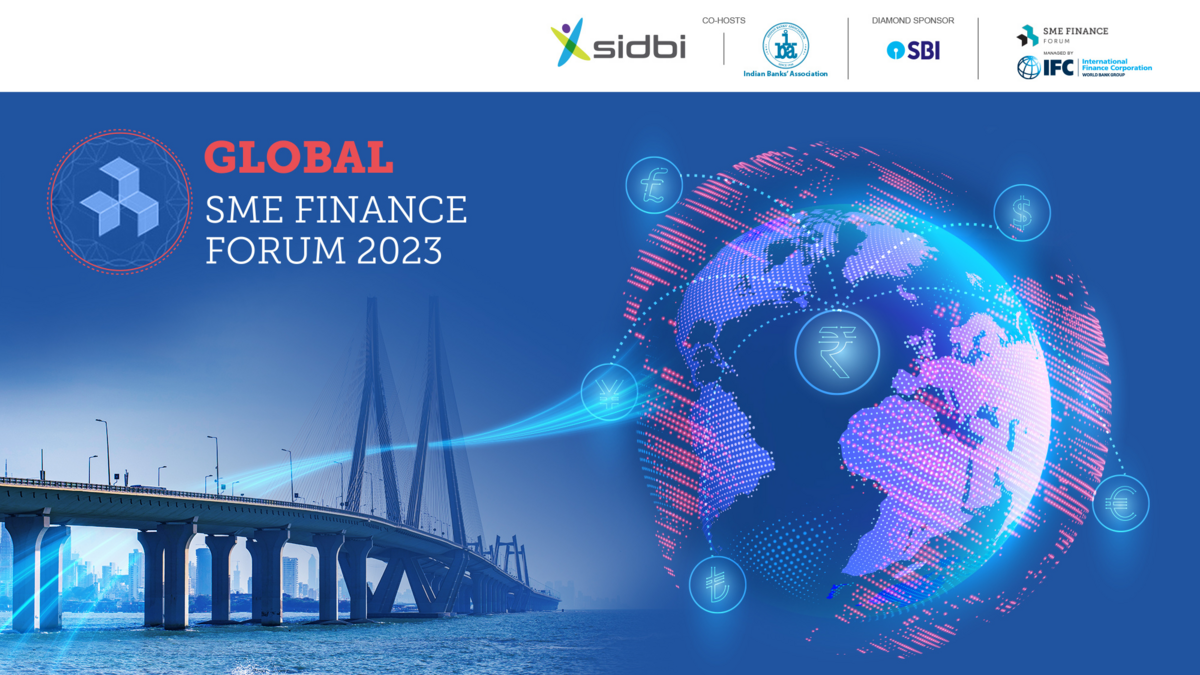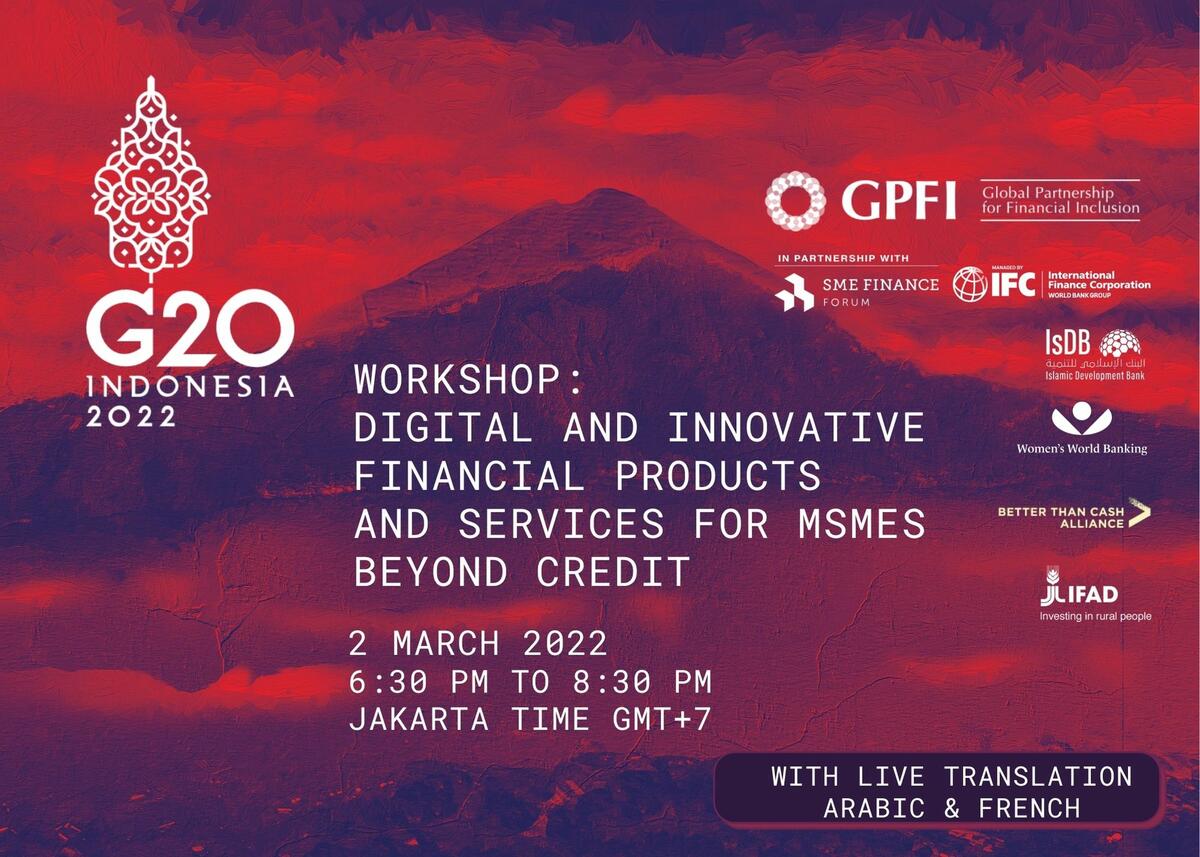Blog
Accelerating trade, financing, and growth opportunities for MSMEs

Summary of the SME Finance Virtual Marketplace – January Live Session.
On January 11th, the SME Finance Forum Marketplace session gathered four fintechs, offering services ranging from growth partnerships and mobile money float financing to ‘trust’ scoring and trade financing support.
Building a Trust-Driven SME Lending Ecosystem
DigiAlly, represented by its Chief Executive Officer and Managing Partner Shrikant Patil, is, at its core, a digital partner for small- to medium enterprises – a business ethos from which the company gets its name. Based in Singapore, DigiAlly was quick to realise that almost five out of six SMEs in emerging markets could not access financing. Why is this gap not being addressed by financial service providers? This is the question that DigiAlly asked of banks, financial institutions, and other financial service providers. DigiAlly found that, as SMEs were developing and becoming increasingly digitalised, they needed representation to bridge the gap between the small-scale enterprises and financial institutions.
DigiAlly discovered there was a $5.4 trillion gap in unmet financing needs in emerging market-based SMEs. One of the main challenges that financial institutions face when assessing SMEs for loans is that there are no benchmarks available to gauge the profitability ratio, liquidity ratio, growth-profit ratio, and other financial ratios specific to SMEs. Thereby, DigiAlly studied these ratios, benchmarked them across 20 countries and looked to provide these parameters embedded within their SME risk models. Banks and financial institutions have been using their own internal credit scoring systems to evaluate an SME, but the standards and systems have been geared towards the corporations to review their financial capabilities. However, SMEs are growing entities – their financial parameters are different compared to the corporations, which, in turn, require different benchmarks, which DigiAlly provides through their SME risk models.
DigiAlly is disrupting the traditional lending processes, with their solution to the SME Digital Lending industry, using alternative data from insurance providers, suppliers, marketing and customers, deep-learning models, and their SME risk model, to create the trust score, ranging from platinum to bronze. DigiAlly’s solution addresses key issues experienced by lenders and helps them build meaningful SME relationships for sustainable business growth.
Building the Small Business Bank of the Future
Flow Global, represented by its founders Michael Rothe and Nitin Garg, finance digital or digitised high-growth business activities, underpinning their ambition to be a long-term growth partner for the businesses they finance, and foster lasting business relationships. The business they focus on is retail merchants – businesses central to the developing world, providing more than 80% of all goods and services, and more than 90% in the markets in which they operate, namely Uganda and Rwanda. These retail merchants are, at the end of the day, how consumers can purchase goods from global giants such as Coca-Cola or Unilever, and yet they are largely neglected by banks, even though, especially on the digital business activities, they make healthy margins of 15% per week. Why do banks neglect them? These retail merchants lack collateral. However, there is a huge transformation occurring as merchants digitise their businesses, by becoming physical outlets for the formal financial sector in the form mobile money or banking agents. Moreover, formerly analogue services are digitised, including the sale of FMCG goods which small merchants can buy on online platforms. Importantly, for those trying to finance these small shops, this transformation is a game changer because they are now, by definition, digital payment rails and there is actionable data that can be used for credit decisions.
Flow Global has, cleverly, piggybacked on that transformation and they finance what is visible in digital-business related data, such as sales data, and in the context of mobile money agents, mobile money transaction and commission data. Best performing customers have increased their business four-fold and on average they increase their business by 40% in 6 months. Regarding distribution, the Flow Liquidity Engine was created to merge cutting-edge technology with proven micro-finance approaches to solve SME business challenges. Moreover, the Engine includes the field app that manages the ‘boots-on-the-ground loan officers, as well as the front end, by which customers can engage and interact with the platform.
Importantly, Flow Global is the balance sheet capital provider, but is engaging with third-party lenders and e-commerce platforms who want to provide working capital to license components of their platform. There, Flow Global has gone beyond the requirements of a technology company and has disbursed $38.5 million of loans and created an extremely scalable model, from a unit-economic perspective, for 240,000 merchants across six ecosystems.
Building the Leading MSME Solution Provider in Africa
Traction, represented by its co-founders Dolapo Adejuyigbe and Mayowa Alli, acts as a growth partner for SMEs with a focus on emerging markets, with a base in Nigeria. Traction is looking to build a growth-partner platform, that essentially acts as a ‘one-stop’ shop for SMEs to run their business and optimize profits. Co-founders Dolapo Adejuyigbe and Mayowa Alli, during their professional experience in management consulting, saw a need for a bank-agnostic platform that has the information and access to provide their customers and merchants with innovative business solutions that they can leverage for growth and expansion.
Within Traction, there are three foundational pillars – payments, loans, and business tools. Through the payment pillar, Traction offers businesses multiple payment options such as POS terminals and bank transfer services. Secondly, Traction works in revenue-based financing, following assessments of merchant accounts, to see payment cash-flows and the frequency and trends of payment in-flows from all channels. Traction, moreover, offers its merchants an array of business tools including inventory management, book-keeping, and e-commerce store set-up. All these business solutions culminate into an eco-system that offers business owners the support they need to nurture and expand.
Beyond the solutions offered by Traction, their business model is centred around providing African MSMEs with a platform and community that supports and facilitates their business growth. Hence their recent partnership with a community focused on business owners, The Growth Trybe. These solutions, partnerships and engagement have allowed Traction's transactions grow by approximately 40% month-on-month and the loan book to expand significantly in Nigeria and across the continent.
Ushering in a Collective Digital Interface for Corporates, Banks, and Trade Intermediaries
360tf, represented by its co-founder and Chief Executive Officer Vikram Lodha, as a fintech, is looking to bridge the gap between financing institutions and those SMEs in need of financing, as well as cross-border trade between SMEs. 360tf’s core objective is to reduce the cost of trade financing, to optimise operations and to promote financial inclusion for exporters and importers across the world. They intend to aggregate and digitise the traditional trade finance market by promoting corporation-and-SME-to-bank and business-to-business relations, as well as building bridges between banks themselves.
360tf seeks to undertake the multi-trillion-dollar international trade market across goods and services. All these transactions are at the behest of undertakings by importing/exporting corporates supported by a vast network of government agencies, cargo companies, insurers, and financial institutions. However, all are underpinned by cross-border financing, which 360tf facilitates. In doing so, they offer a range of products in both the primary market FI risk and the secondary market. Once the risk has been booked in the primary side, the products offered by 360tf range from confirmation, discounting, refinancing, bankers’ acceptance and bank guarantees, following which, the transaction moves into the secondary market, where the products are centred around risk participation in executed transactions. The shift from the primary to the secondary is central to the business model so that primary risk gets freed up and new transactions can be booked. In this way, 360tf produces a continuous cycle, end-to-end, that starts at the corporate to the primary bank, secondary bank and then corporate again once the risk is freed up.
The traditional process of cross-border trade is one of inefficiency and high costs for financing, however, 360tf’s Digital Price Discovery offers a direct, hassle free, and digital way of connecting with more than 250 financial institution partners across the globe with competitive pricing, real time underwriting network and an audit trail for importers/exporters.
About the companies pitching
DigiAlly is a Singapore-based fintech supporting SME lenders and fintech players for better decision-making by providing trust scores to SMEs.
Flow Global is an inclusive fintech enabling small merchants to grow through instant working capital. The company is focused on mobile money float financing, a segment it chose as an entry point and in which it established itself as a trailblazer in Uganda and Rwanda.
Traction is a growth partner for MSMEs in Africa. Their vision is to partner with businesses providing solutions they need for every aspect of business management and growth.
360tf is a Singapore-based fintech with regional offices in India and the UAE and more than a decade of trade finance experience. They bring the trading world closer by connecting Importers & Exporters with partner banks to fulfil their trade financing requirements and address trade financing gaps.








